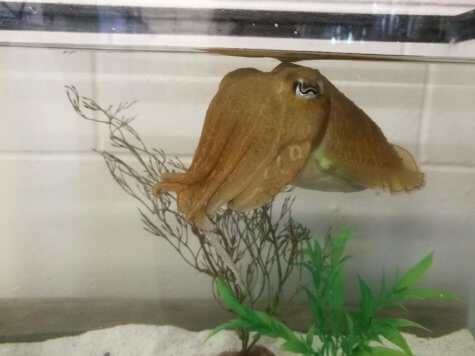Cuttlefish may be ugly, but they are smart apparently. They have self control which is weird because if you’ve ever seen an animal eat (like your dog) you know that most of them would eat until they died. Now we have to update the rankings on Earth’s “Power Food Chain”: Reptilians, humans, robots, monkeys, cuttlefish, dolphins (robots will obviously pass us in the next few years and fight it out with the reptilians so lets just concentrate on not letting the monkeys and cuttlefish pass us).
– Nick J
Just how many truly intelligent species are there living on planet Earth? While they may not be living “in a pineapple under the sea,” a new study finds there’s at least one marine species that shows the intelligence of human children. Researchers at the Marine Biological Laboratory say cuttlefish have passed a test designed to measure the advanced skill of delayed gratification in primates.
Just like how kids try to resist eating snacks during a popular TikTok challenge, scientists use the “marshmallow test” to measure if a subject can wait for a better option (like a more appetizing meal) to arrive. Just like children, cuttlefish displayed the ability to delay gratification as well. Study authors say this is the first time the link between self-control and intelligence has appeared in a species other than humans and chimpanzees.
“We used an adapted version of the Stanford marshmallow test, where children were given a choice of taking an immediate reward (1 marshmallow) or waiting to earn a delayed but better reward (2 marshmallows),” says lead author Alexandra Schnell in a media release.
“Cuttlefish in the present study were all able to wait for the better reward and tolerated delays for up to 50-130 seconds, which is comparable to what we see in large-brained vertebrates such as chimpanzees, crows and parrots.”
The study finds cuttlefish who waited longer for the right meal also performed better on other cognitive learning exams. In those experiments, cuttlefish learned to associate a visual signal with a food reward. Researchers then reversed the test, so the reward became linked to a different signal for the marine animal.
“The cuttlefish that were quickest at learning both of those associations were better at exerting self-control,” Schnell reports.
How did cuttlefish get so smart?

Study authors say how the species evolved to be able to delay gratification is a bit of a mystery. For humans, scientists believe the trait strengthens social bonds. An example would be when you see someone wait for a partner to eat before them. Delayed gratification can also be a function of tool-buildings animals, who need to make hunting tools before they can eat.
For cuttlefish, however, researchers say they don’t build tools and are not social creatures. For them, Schnell believes delaying gratification is likely the end result of having to camouflage themselves to stay alive.
“Cuttlefish spend most of their time camouflaging, sitting and waiting, punctuated by brief periods of foraging,” the researcher from the University of Cambridge explains. “They break camouflage when they forage, so they are exposed to every predator in the ocean that wants to eat them. We speculate that delayed gratification may have evolved as a byproduct of this, so the cuttlefish can optimize foraging by waiting to choose better quality food.”
Researchers add that finding a link between self-control and cognitive ability in an animal other than primates is a stunning example of convergent evolution. This is the event in which completely separate evolutionary histories still lead to the same signs of intelligence.
The study appears in the journal Proceedings of the Royal Society B.
Via StudyFinds

